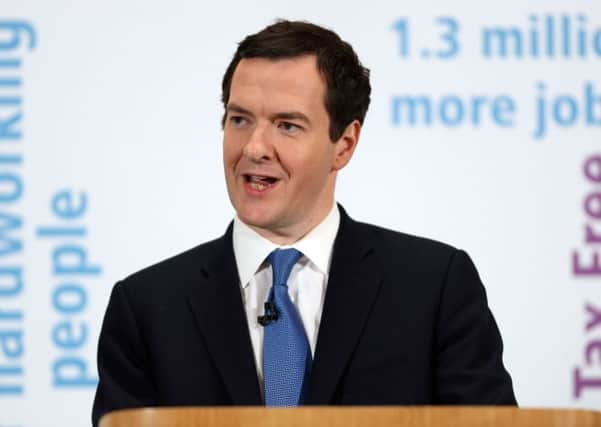Treasury ‘did not press Co-op to buy 600 Lloyds Bank branches’


He told MPs on the Treasury Select Committee the Treasury did not put “undue pressure” on the Co-op to buy the branches after allegations of political interference made by the disgraced fomrmer Co-op Bank’s chairman and Bradford councillor Paul Flowers.
Mr Flowers, who resigned and was later bailed in connection with alleged drugs supply offences, claimed last month that politicians pressured the bank into the Lloyds deal, known as Project Verde.
Advertisement
Hide AdAdvertisement
Hide AdBut in a letter to Andrew Tyrie, chairman of the Treasury Select Committee, Mr Osborne said: “We were always very clear both that the commercial decision on the Verde sale was a matter for Lloyds and that the then-regulator the FSA (Financial Services Authority) should decide whether to allow the sale to proceed or not.”
He added: “At all times, both Ministers and officials made clear to the FSA that the regulatory decision on whether to allow the Co-op/Verde deal to proceed – and, in particular, the prudential judgment on whether there were financial stability concerns from doing so – was a matter wholly and solely for it. At no point did the Treasury seek to interfere in those judgments.”
MPs are investigating the deal and the subsequent near-collapse of the Co-operative Bank, which had to be rescued by bondholders including US hedge funds after a £1.5bn black hole was found in its finances.
Lloyds was ordered to sell the branches by European regulators as a condition of its £20.5bn bailout at the height of the financial crisis. It announced a £750m agreement to sell 632 branches to the Co-op in July 2012, but the deal collapsed the following year after the huge shortfall in the mutual’s capital level was discovered.
Advertisement
Hide AdAdvertisement
Hide AdMr Tyrie wrote to Mr Osborne last month demanding he address the claims made by Mr Flowers, who told BBC 2’s Newsnight then-junior Treasury Minister Mark Hoban made calls to the Co-op two or three times a week over the issue. Former Co-op Group chief executive Peter Marks has already told the committee he was not put under any political pressure, as has Lloyds boss Antonio Horta-Osorio.
Mr Osborne confirmed that regulatory stress tests revealed balance sheet concerns surrounding the Co-op Bank in the second half of 2012, but added the Treasury was only made aware of the issues in early 2013, just before the Co-op withdrew from the deal.
Mr Osborne was grilled over the Government’s involvement in the proposed sell-off of Lloyds branches when he appeared before the Treasury Select Committee, but insisted that he had not exerted pressure for a deal.
He said Labour was trying to use the suggestion to divert attention away from the responsibility of the Co-op’s management for what happened, and cited evidence given to the committee by Mr Marks and Mr Horta-Osorio, as well as the Bank of England’s former governor Lord (Mervyn) King and deputy governor Andrew Bailey.
The Chancellor told the cross-party committee: “We were keen to see the Lloyds branches sold. Lloyds came to us and said ‘Co-op is the preferred bidder’ and we were content with that.”